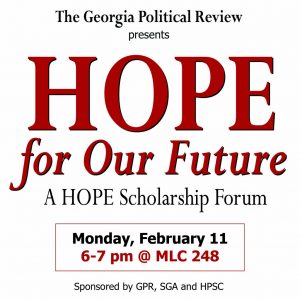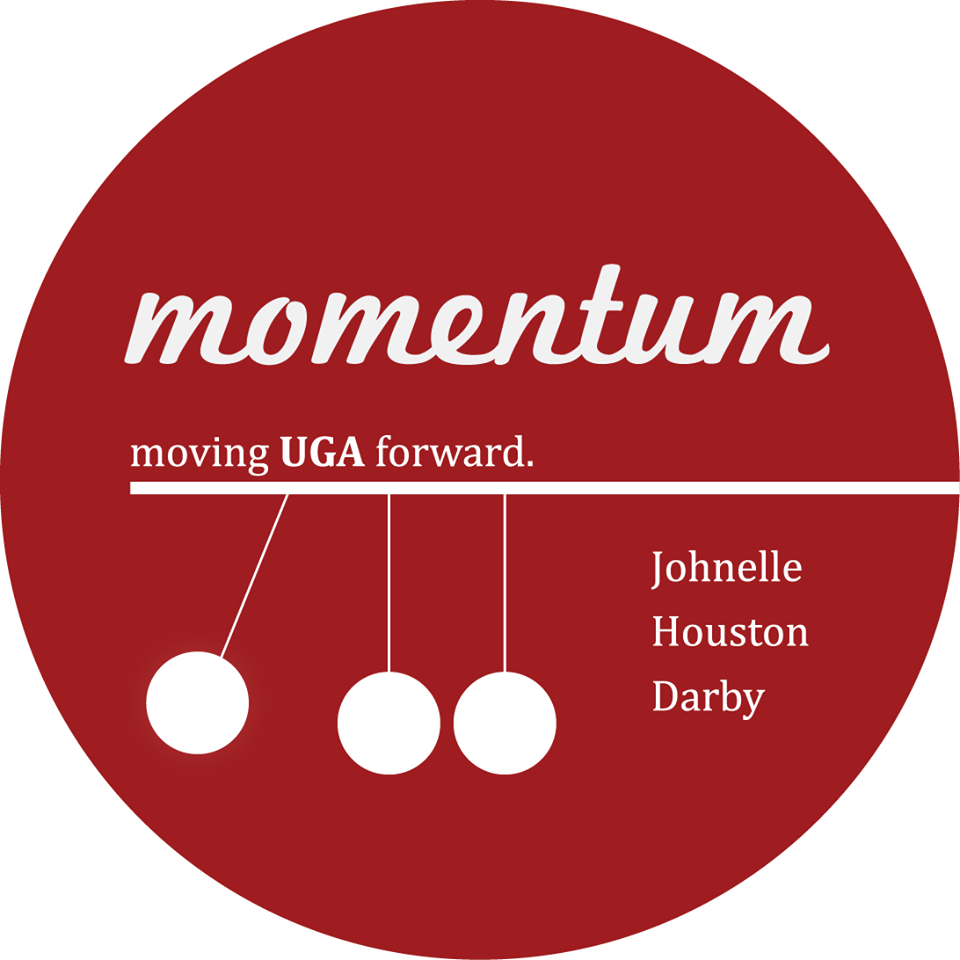 By: Uzma Chowdhury and Andrew Roberts
By: Uzma Chowdhury and Andrew Roberts
On Monday, Feb. 11, university students gathered to discuss the current state and future fate of the HOPE scholarship. The event, sponsored by Georgia Political Review (GPR) and Student Government Association (SGA), featured a number of a speakers as well as a question-and-answer session. University of Georgia students are particularly passionate about the scholarship as it allows many to afford higher education, but also because often the HOPE scholarship is the primary incentive for students to remain in-state as opposed to attending an out-of-state or private university.
Currently, the HOPE scholarship pays a majority of tuition for academically successful students – those who graduate high school with a minimum 3.0 grade point average (GPA) and achieve a score of 26 on the ACT or an 1850 on the SAT. The Zell Miller scholarship pays full tuition for outstanding students – those who graduate high school with a minimum 3.7 GPA and achieve a score of 26 on the ACT or a combined 1200 on the math and reading sections of the SAT.
The purpose of the event was to provide a forum for UGA students to ask their questions about the scholarship and express their concerns about potential changes. The Georgia state legislature has talked about adjusting the scholarship to make it more financially solvent through a number of means. The UGA SGA Senate has also put forward a number of plans to help lengthen the scholarship’s lifetime. Ideas that have been mentioned from the two voting bodies include an income cap, increasing GPA and standardized test score eligibility requirements, a first-year reimbursement program, and video lottery terminals.
After an introduction from GPR Editor-in-Chief Tucker Green, the event started with a brief video made by Senator Jason Carter (D-Decatur) exclusively for the forum. Carter has sponsored legislation that would change eligibility requirements to HOPE including SB 59, SB 112, and SR 185. He is the co-chair of a special Senate Task Force on Education. Carter was not able to attend the forum but instead was willing to answer a number of questions raised by GPR. He expressed the pride that the state legislators have in the scholarship and said that rather than cutting HOPE for everyone, they should consider the financial need of those attending college.
The next person to speak was Professor Christopher Cornwell. He is the head of the Department of Economics and a professor teaching and researching in the principal fields of applied economics, labor economics, and the economics of education. Cornwell and Professor David Mustard have done extensive research on the HOPE scholarship. Cornwell spoke about a number of things, but stressed the importance of the word “access” when talking about the scholarship. He said that when legislators talk about higher education, “access” is a critical word because the goal is to allow more people to attend college.
After Professor Cornwell, SGA Senator Trip Calloway and SGA Executive Director of Public Affairs Sarah Beck spoke about SGA’s work on the scholarship. They have worked on a number of resolutions to express the student body’s goals and concerns regarding the HOPE scholarship. These include a first-year reimbursement program, a resolution to keep HOPE merit-based, and a plan to use video lottery terminals. Calloway and Beck spoke about their proposals and defended keeping HOPE merit-based against Carter’s view of looking at need first.
The general mood of the forum’s participants was definitely concern—concern for the future, not only for themselves, but also for the future of the University of Georgia. Students asked about certain issues that affected them, such as the ability to pay for a first-year reimbursement program and standardized test requirements that favor metropolitan Atlanta students who can afford test preparation programs. A couple students expressed concerns that SGA’s resolutions favor the wealthy – referring to maintaining merit-based scholarship and the first-year reimbursement program – to which Beck replied that their resolutions are simply expressions, not policies.
The event was an important forum for students to express their views and ask their questions about the HOPE scholarship. SGA is hosting “Dawgs at the Dome” on Feb. 14 to continue lobbying for the scholarship at the state capitol. GPR is sending two students to support the lobbying effort, so look out for an article about that event very soon.

